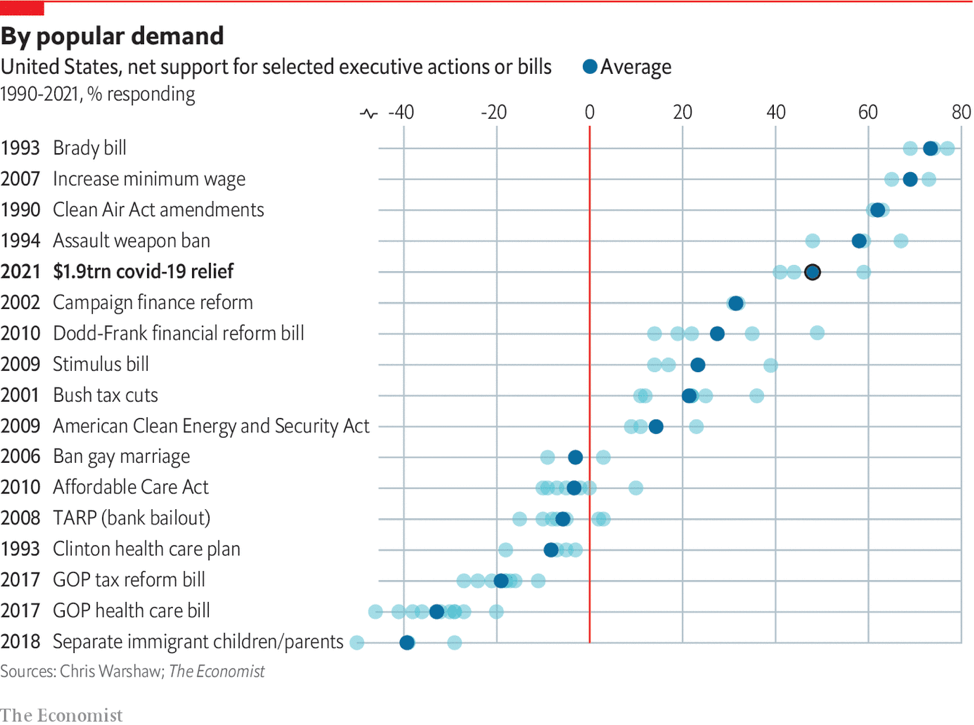
Published on March 4, 2021 / Leer en español
Dear Readers:
Disease and epidemics have changed the course of history for millennia and we see no reason why the COVID-19 pandemic should be any different. As the finish line of the current pandemic comes into view, it should not be surprising to see a significant increase in forecasts about the post-pandemic world. Some, like the editors of The Economist, think we are entering a new “Roaring 20s”, while others, such as conservative writer Peggy Noonan believe the “pandemic changed everything.” Other writers, such as Fareed Zakaria and the historian Yuval Noah Harari, offer more moderate assessments of the future.
The basic rule of a crisis, writes Pope Francis, “is that you don’t come out of it the same. If you get through it, you come out better or worse, but never the same.” If the historical record is any guide, then we should expect profound economic, political, and social changes in the near future. Many people have finally realized how fragile our society really is and how weak and thin are the buffers between civilization and social apocalypse. The difficult part, of course, is figuring which specific changes will occur and when.
It will probably be in the economic realm where we will witness the first significant differences with the pre-pandemic past. Thousands of businesses have closed, millions are still unemployed. Some of those jobs will come back, but many will not, due to increased automation and people exiting the paid labor force for good. Global flows of capital, goods, and people will slow down, while most international firms will reconfigure their supply chains to focus on redundancy at the cost of lower short-term profits. Many people are also re-examining their lives and personal approach to work, as individualism and materialism give way to more communitarian values, and they realize that “work won’t love you back.”
Economic changes will inevitably affect politics and unsettle traditional political coalitions, but these effects usually take longer to materialize. Calls for a more assertive state, better governance, and increased state capacity to deal with natural disasters (including pandemics) have also led, unfortunately, to a questioning of liberal democracy itself and its ability to shelter and assist citizens in times of distress. Ironically, these pressures to look inward and “take care of our own first” come at a time when broader and deeper international cooperation will be required to address the challenges of climate change and other cross-border threats.
Finally, social changes usually lag new economic and political trends. There is some early evidence, however, from surveys in Europe and elsewhere that we highlight in “On Our Radar” section, that the pandemic “has caused [people] to re-evaluate their priorities in life.” Another study, in this case by the IMF, found increased support for higher progressive taxes among people who have been directly affected by the pandemic, even among self-described economic conservatives. It may, however, take us a decade or two to fully understand the meaning and impact of this re-examination of values.
So, in the end, there is some hope that we may come out of this crisis in better shape. But for that hope to become reality, we need, again in the words of Pope Francis, “to see clearly, choose well, and act right.”
—Sergio M. Marxuach, Editor-in-Chief
Insights + Analysis from CNE

SSI Litigation Update
By Sergio M. Marxuach, Policy Director
There have been two recent developments in the ongoing litigation regarding the application of the Supplemental Security Income (“SSI”) program to residents of Puerto Rico. On March 1, the Supreme Court of the United States granted a Petition for Certiorari in the case of United States v. Vaello-Madero. Second, on February 24, the U.S. Department of Justice (“DOJ”) filed a Reply Brief in its appeal to the Court of Appeals for the First Circuit in the case of Peña-Martinez v. U.S. Department of Health and Human Services.
In Vaello-Madero, the U.S. District Court for Puerto Rico found, among other things, that excluding the plaintiff from the SSI program solely because he lived in Puerto Rico violated the equal protection component of the Fifth Amendment’s Due Process Clause. The U.S. government appealed to the Court of Appeals for the First Circuit, which upheld the lower court’s ruling but applying a different legal analysis. The federal government then filed a Petition for Certiorari with the Supreme Court, which as we stated above, was recently granted. The question for review before the Supreme Court is:
“Whether Congress violated the equal-protection component of the due process clause of the Fifth Amendment by establishing Supplemental Security Income — a program that provides benefits to needy aged, blind and disabled individuals — in the 50 states and the District of Columbia, and in the Northern Mariana Islands pursuant to a negotiated covenant, but not extending it to Puerto Rico.”

Reinvigorating the Puerto Rico Task Force
By Rosanna Torres, Director – Washington, D.C. Office
Management of territorial affairs has historically fallen under the purview of the Department of Interior’s Office of Insular Affairs. However, President Kennedy changed that situation in the case of Puerto Rico by issuing a memorandum ordering that all matters regarding the U.S.-Puerto Rico relationship be referred to the Office of the President. President George H.W. Bush followed up on this directive by issuing another memorandum requiring all departments, agencies, and officials of the Executive Branch to treat Puerto Rico administratively “as if it were a state.”
More recently, responsibilities specifically related to Puerto Rico affairs have been assigned to the Executive Branch’s Office of Intergovernmental Affairs and several prior Administrations have addressed Puerto Rico issues through the creation of interagency task forces that have looked into and exercised their responsibilities over the island.
Taking a particular interest in the political relationship between the U.S. government and the Commonwealth’s government, in late 2000, the Clinton Administration created the President’s Task Force on Puerto Rico’s Status to “facilitate action on matters related to proposals for Puerto Rico’s status and the process by which an option can be realized.” Following suit, the George W. Bush Administration issued two reports expanding on the relationship with the Government of the United States and options for its future relationship. Under the Obama Administration, a similar approach was undertaken in 2011.
Data Snapshot
Minority Rule?

The men who wrote the U.S. Constitution were equally concerned about the potential abuse of a political minority by the majority, as well as the reverse, the oppression of the political majority by a minority. In its almost 235 years of existence, however, the American constitutional system has been ably manipulated by members of a political minority, mostly Southern racists, to impose its will over the majority.
The U.S. Senate is currently split 50/50 between both parties. Yet, Democrats represent 41.5 million more Americans than the Republicans do, in a nation that has 328.2 million people. In addition, Republicans can use the filibuster to stop any bill in the Senate.
You may well say that those are the rules, and they can be manipulated in equal measure by both Democrats and Republicans. Fair enough. But what is surprising is that highly popular bills oftentimes fail to be enacted or are so only by using procedural shenanigans. The fact no Republican in the House voted for the Biden COVID-19 Relief Package, which according to recent surveys counts with the support of 76% of the population, is indicative, then, of a perilous trend towards minority rule in the United States.
On Our Radar...
![]() Rising Authoritarianism – “After the Cold War ended, it looked like democracy was on the march. But that confident optimism was misplaced. With the benefit of hindsight, it is clear that it was naive to expect democracy to spread to all corners of the world. The authoritarian turn of recent years reflects the flaws and failings of democratic systems. Most analyses of the precarious state of contemporary democracy begin with a similar depiction. They are not altogether incorrect. But they omit an important part of the picture. The story of the last two decades is not just one of democratic weakness; it is also one of authoritarian strength”, writes Yascha Mounk in Foreign Affairs.
Rising Authoritarianism – “After the Cold War ended, it looked like democracy was on the march. But that confident optimism was misplaced. With the benefit of hindsight, it is clear that it was naive to expect democracy to spread to all corners of the world. The authoritarian turn of recent years reflects the flaws and failings of democratic systems. Most analyses of the precarious state of contemporary democracy begin with a similar depiction. They are not altogether incorrect. But they omit an important part of the picture. The story of the last two decades is not just one of democratic weakness; it is also one of authoritarian strength”, writes Yascha Mounk in Foreign Affairs.
![]() Social Impact of the Pandemic – According to a 24-country survey carried out by Ronald Inglehart, Founding President of the World Values Survey Foundation, and Martijn Lampert, Co-founder and Research Director at the international research agency Glocalities, “the impact of the pandemic has had a sobering effect on people, igniting pessimism and worries, but at the same time has caused them to re-evaluate their priorities in life, emphasizing more communitarian values.”
Social Impact of the Pandemic – According to a 24-country survey carried out by Ronald Inglehart, Founding President of the World Values Survey Foundation, and Martijn Lampert, Co-founder and Research Director at the international research agency Glocalities, “the impact of the pandemic has had a sobering effect on people, igniting pessimism and worries, but at the same time has caused them to re-evaluate their priorities in life, emphasizing more communitarian values.”
![]() Will We Ever Learn? – “An off-course polar vortex meandered toward the Mexican border, bringing with it frigid Arctic air rarely seen as far south as Texas. Frozen equipment rendered power generation systems in the state inoperable, forcing grid operators to begin rolling blackouts to customers then left to fend for themselves in the glacial weather. The year was 2021. And 2011. And 1989. These same scenes have played out before across the Lone Star State, and experts previously had warned that they would happen again if Texas power generators, grid operators, and lawmakers failed to make the necessary investments to address the problem”…and in mid-February 2021 “Texans suffered the consequences, with more than 50 deaths, over 4 million homes and businesses losing power, 7 million forced to boil tap water before drinking it, and a price tag already in the billions of dollars”, according to Dana Nuccitelli, writing for the Yale Climate Connections blog.
Will We Ever Learn? – “An off-course polar vortex meandered toward the Mexican border, bringing with it frigid Arctic air rarely seen as far south as Texas. Frozen equipment rendered power generation systems in the state inoperable, forcing grid operators to begin rolling blackouts to customers then left to fend for themselves in the glacial weather. The year was 2021. And 2011. And 1989. These same scenes have played out before across the Lone Star State, and experts previously had warned that they would happen again if Texas power generators, grid operators, and lawmakers failed to make the necessary investments to address the problem”…and in mid-February 2021 “Texans suffered the consequences, with more than 50 deaths, over 4 million homes and businesses losing power, 7 million forced to boil tap water before drinking it, and a price tag already in the billions of dollars”, according to Dana Nuccitelli, writing for the Yale Climate Connections blog.
